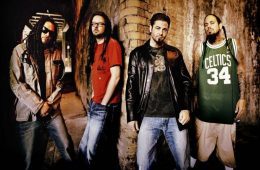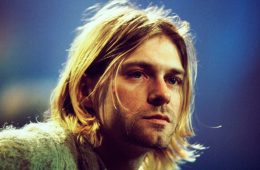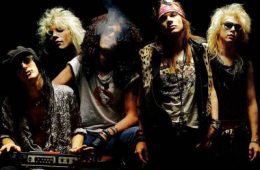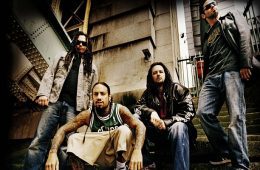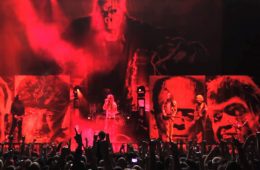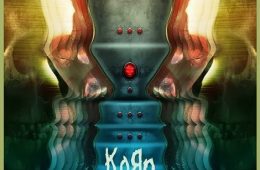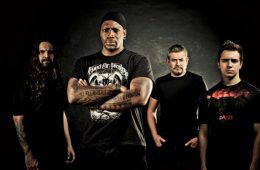korn
SLIPKNOT Members Join KORN On Stage
Members of SLIPKNOT joined KORN on stage on Friday, January 23...
KISS, KORN, BLACK SABBATH, SLIPKNOT, ANTHRAX Members React To ROBIN WILLIAMS’ Death
Paul Stanley (KISS), Tom Morello (RAGE AGAINST THE MACHINE), Ozzy Osbourne (BLACK SABBATH), Brian "Head" Welch (KORN), Corey Taylor (SLIPKNOT, STONE SOUR), Yngwie Malmsteen, Charlie Benante (ANTHRAX), Stephen Pearcy (RATT), Michael Sweet (STRYPER) and Lzzy Hale (HALESTORM) are among the musicians who reacted on Twitter and Facebook to the passing of actor and comedian Robin Williams, who died earlier today (Monday, August 11) of a suspected suicide due to asphyxia.
Williams was found dead at his home in Tiburon, California.
A forensic examination is set to take place on August 12.
The actor was reportedly battling severe depressing before his death.
His third wife, Susan Schneider, released a statement after the announcement of his death.
"This morning, I lost my husband and my best friend, while the world lost one of its most beloved artists and beautiful human beings," she wrote. "I am utterly heartbroken.
"On behalf of Robin's family, we are asking for privacy during our time of profound grief.
"As he is remembered, it is our hope the focus will not be on Robin's death, but on the countless moments of joy and laughter he gave to millions."
KORN’s BRIAN ‘HEAD’ WELCH Says He ‘Hates’ Religion, Has Found Satisfaction In ‘Relationship Through Christ’
Matt Pinfield of Fanpass conducted an interview with KORN guitarist Brian "Head" Welch at this year's Welcome To Rockville festival, which was held April 26-27 at Metro Park in Jacksonville, Florida. You can now watch the chat below.
Welch, a former drug addict and reformed Christian, spoke about what it's like touring with KORN since rejoining the band in early 2013, eight years after first leaving the band. "I like to get high on something, and when I asked the Lord to come and make his home inside of me, the spiritual high, it's so real," Welch said. "And I hate religion — I don't talk about religion at all — but the relationship through Christ is what I found. And I'm totally satisfied. Now I can enjoy raising my kid, I can enjoy jamming with music in KORN, I can enjoy anything I do. It's the best high ever."
Welch also discussed how his attitude has changed since first he fell victim to the pitfalls and excesses of rock stardom, saying: "When you get that big, everyone's, like, crawling after you and everything, and you start to believe, even if you don't say it, you start to believe that it's about you. And what I've come to realize is it's all about them, it's all about the fans, it's all about them and the music. You're here to give to them, not to be some king rock star. It's all about them."
As previously reported, Welch is getting ready to write his fourth book. Welch, who has three previous tomes to his credit, told The Pulse Of Radio that his new one will focus on the time he spent away from KORN between 2005 and 2013. "I call 'em like 'the wilderness years,' when I was gone in a way, raising my daughter and doing all that stuff for all those years," he said. "And then, you know, getting together with the KORN guys again and — you know like my first book, like I told about my whole childhood and all the details and everything? I'm gonna do the same with this during like the mysterious 'wilderness years,' I like to call 'em."
Welch's previous books include 2008's "Save Me From Myself: How I Found God, Quit Korn, Kicked Drugs, And Lived To Tell My Story", a young adult variation on that called "Washed By Blood: Lessons From My Time With Korn And My Journey To Christ" and 2010's "Stronger: Forty Days Of Metal And Spirituality".
Welch left KORN in 2005, got sober and embraced Christianity, saying that as a single father he did not want his daughter around the rock and roll lifestyle. "The last two years I was in KORN, I partied non-stop and started doing speed every day," he said. "I got so addicted that I got scared. I tried to go to rehab, but that didn't work. No one could help me. Then I ended up seeing if Jesus was real, and He instantly took the drugs away. He revealed Himself to me and gave me the strength. Once I figured that out, I knew I was accountable to God."
Welch pursued a solo career for several years before rejoining KORN onstage in 2012 at a festival. He reunited with the group permanently last year and recorded his first album with them in 10 years, "The Paradigm Shift".
JUDAS PRIEST, KORN, ALICE IN CHAINS, Ex-PANTERA Members Pay Tribute To KURT COBAIN
According to The Pulse Of Radio, this Saturday (April 5) marks the 20th anniversary of the death of NIRVANA founder and frontman Kurt Cobain at the age of 27. Cobain, who killed himself with a shotgun in a room above the garage of his Seattle home, instantly joined the pantheon of rock legends who died too early, including Jim Morrison, Janis Joplin, Jimi Hendrix, Bon Scott, and more. Yet while many of those artists lived the rock star lifestyle to the fullest, Cobain was branded as something that he, by all accounts, never wanted to be — the spokesman for an entire generation. It's widely felt that Cobain's inability to reconcile his inner demons and fear of "compromise" with NIRVANA's massive success drove him to depression, drugs, and ultimately, suicide.
KORN guitarist Brian "Head" Welch recalled hearing NIRVANA's music and sensing that Kurt Cobain was already in a lot of pain. "I just remember tripping and going, 'Wow, that guy must have been like really in a dark place,' you know," he said. "It just shows you, you know, like that life isn't all about fame and being a rock star and making it and money and all that stuff, you know. It's about finding like who you are and being happy inside and finding that place, because you can have the whole world and still want to kill yourself. You know, even 20 years later, it's like a reality check, you know. We should use this, his anniversary of his death, as a reality check."
Former PANTERA and current HELLYEAH drummer Vinnie Paul Abbott said that while NIRVANA's success did a lot of damage to the metal scene at the time, he still liked the band and was shocked by Cobain's death. "NIRVANA was a huge band and I, like everybody else, I think — I don't know anybody who ever said they weren't a fan of them — thought they were great," he said. "And I was terribly shocked and kind of mortified as to what happened, you know. I never knew Kurt was that depressed and that kind of stuff, you know. Just didn't seem that way to me, you know. He was just big and larger than life."
ALICE IN CHAINS guitarist Jerry Cantrell was coming up on the Seattle music scene at the same time as NIRVANA and ran into Cobain occasionally. "I didn't really know Kurt that well, but there was a guy I always admired," he said. "We didn't spent much time together, but the few times we did spend together, you know, were times I'll always remember. You know, he was a really sweet guy, and a really genuine soul, you know, and an incredibly talented artist."
JUDAS PRIEST singer Rob Halford sums up what Kurt Cobain meant to rock music. "He was an absolute genius," he said. "In the legacy of rock and roll music, he'll be there with, like, Hendrix and Lennon and Joplin and Morrison. Incredibly evocative, inspiring, controversial, human musician. For me, there's been nothing great since NIRVANA, in the way it shook up the world. There's been nothing great since that band."
GUNS N’ ROSES, KORN To Perform At This Year’s REVOLVER GOLDEN GODS Awards
The Revolver Golden Gods awards show presented by Epiphone, America's only hard-rock and heavy-metal awards show, has announced its return to Club Nokia in Downtown Los Angeles on Wednesday, April 23.
KORN’s JONATHAN DAVIS Says OBAMA Is Becoming ‘More Of A Dictator’, Claims USA Is Turning Into ‘Police State’
KORN frontman Jonathan Davis was interviewed on the February 17 edition of "The Alex Jones Show", the program hosted by noted conspiracy theorist Alex Jones. You can now watch video footage of Davis' appearance below.
Asked about the inspiration for KORN's "Spike in My Veins" video — which overlaps important news reports of government lookout and major political figures with modern pop acts such as Justin Bieber, Miley Cyrus and Kanye West — Davis said: "For a long time, I've been into what's going on with our country.
"I don't necessarily consider myself a political person, but over the years, I've seen what's been going on, and it's time to do something about what's going on with our country and the system and everything that's going on.
"It seems really sad that everybody's so asleep and oblivious to the fact that the country uses the media to capture people's attention or take away from the fact that what's going on with our country.
"It really freaked me out when the whole Miley Cyrus thing was going on, and when that went down, [President] Barack [Obama] passed that new law that he can imprison anyone he wants and he doesn't have to charge them and he can keep them as long as he wants.
"Basically, all our liberties are being taken away one by one, and finally, I feel like it's time… I've gotta do something and try and get as many people as we can to wake up and see what's really going on."
Asked about the meaning behind the title of KORN's 11th studio album, last year's "The Paradigm Shift", Davis said: "I think it's time for us as normal people to come up and fight against the powers that be.
"I think this country was founded and based in the beginning and set up for us to have revolutions when we don't like our government and what our government has done and taken over and taken away all our privacy and all the things going on with the drones…. I mean, everything. It's a scary time, and I think that someone's gotta do it in our position, someone's gotta speak out to the younger audience and let them know what's going on and how to wake up and take back their privacy."
He continued: "Big Brother is alive and well. I mean, you're looking at me on my camera phone. It wasn't about putting up cameras. I think we've already got cameras everywhere. You can't tell me that there's no backdoors for everybody to see, so that the powers that be can see what we're doing and watch what we're doing at all times. And I'm not comfortable with that. And I think it needs to go. And they're building that huge-ass building, NSA is, for all the spying, and it's just gonna get worse and worse. I mean, it's scary times, brother.
"Nobody cares what's going on behind the closed doors when Obama makes all these crazy laws that take away more and more of our privacy. It'll make you more of a dictator.
"Something's gotta happen, man. It's gotta stop."
Davis also elaborated on why he thinks Obama is becoming more of a "dictator" as time goes on.
"I mean, I've said it before. I think he's an illuminati puppet," the singer said. "It just doesn't make sense, the whole thing. The guy comes from out of nowhere, he gets made president, all this stuff starts happening. I don't know… It just didn't make sense to me. And to top top it off, I'm not really a political person, I don't know much about it, I'm just worried about my privacy and my children's privacy. This being America, we're supposed to be the 'land of the free,' and it's becoming a police state."
He added: "I just want us to become the country we used to be.
"I remember, when I was a kid, how amazing our country was, and as I've grown up and watched things happen, I just want it to be like it used to be.
"Like I said, I'm not really a political person and I don't wanna come off like I don't know what I'm talking about, but I really wanna leave a world for my kids to have the liberties and the privacy that this country was founded on."
"The Paradigm Shift" sold 46,000 copies in the United States in its first week of release to land at position No. 8 on The Billboard 200 chart. The CD arrived in stores on October 8, 2013 via Prospect Park.
Davis last year revealed that he got into the studio later than the rest of the group because he was dealing with personal issues. He explained, "My boy got diabetes and I had come off medication for my depression, and that fucked me up . . . I'd been on it for three years and the doctor told me you gotta get off this, it's bad for you."
Davis took drastic action to get off his medication, saying, "I went to this county rehab. I was like, 'I don't want to do this shit ever again.' So I went into the most ghetto, fucked-up place I could find and I'm barely coming out of it now."
ROB ZOMBIE And KORN Join Forces For Cover Of DIAMOND HEAD’s ‘Am I Evil?’ (Video)
Rob Zombie and his band were joined by KORN guitarists Brian "Head" Welch and James "Munky" Shaffer on stage on November 10 in Rapid City, South Dakota to perform a cover version of the DIAMOND HEAD classic "Am I Evil?" (a song famously covered by METALLICA). Video footage of the performance can be seen below (clip filmed by Sébastien Paquet and Mark Bennett).
Korn
The Paradigm Shift
It is really amazing how that was achieved, but ladies and gentlemen, this is the eleventh album for Korn since their self-titled debut in 1994. Eleven albums in nineteen years show that this band was never feeling safe about its music, while the sales and recognition they’ve achieved so far could easily drive them to a state where they would release albums every three or four years, like many other bands have done so far.
Video: SEPULTURA Members Join KORN On Stage To Perform ‘Roots Bloody Roots’
SEPULTURA members Derrick Green (vocals) and Andreas Kisser (guitar) joined KORN on stage last night (Saturday, October 19) to perform SEPULTURA's classic song "Roots Blooody Roots". Professionally filmed video footage of their appearance can be seen below (Note: Skip to around 47-minute mark.) Green wrote on Facebook afterwards: "What a cool surprise tonight rocking out 'Roots Bloody Roots' with KORN!! Too much fun!!"
KORN singer Jonathan Davis was featured as a guest on the track "Lookaway" — along withMike Patton of FAITH NO MORE — on SEPULTURA's 1996 album "Roots".
Speaking to ARTISTdirect, former SEPULTURA frontman Max Cavalera stated about the recording sessions for "Lookaway": "Mike Patton was on the song, and Jonathan's a hugeFAITH NO MORE fan. He was actually freaking out that Patton was there. He was really nervous, which was actually kind of funny. He kept chewing on his hair the whole time he was in the studio. [Producer] Ross Robinson teased him at one point and told him to calm down. [laughs]"
He continued: "'Lookaway' came out of a jam. It's a really heavy riff. Patton started singing this Indian chant, and it gave me goosebumps in the studio when he did that. It was so intense. He showed up in the studio with a Samsonite briefcase. I was like, 'Mike, what's up with the briefcase?' He said, 'It's what I need to record.' It had an echo pedal inside for his voice and a bottle of wine. He opened the wine and we drank it. At one point, the three of us were on the floor of the studio going crazy and making weird noises and sounds! Jonathantook it to another level. He's singing about people with a fear of pussy, which is a crazy concept. It came out as a really cool, obscure song on 'Roots'."

